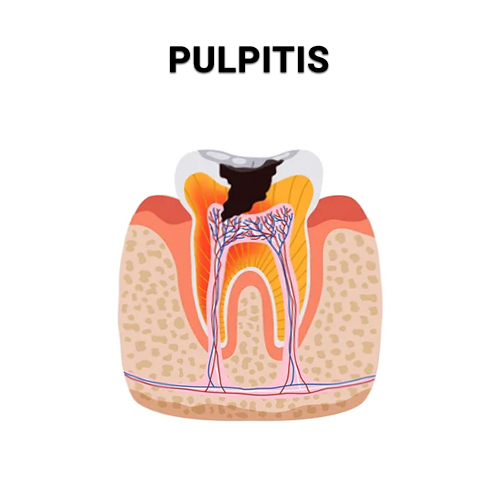Table of contents

The innermost section of your tooth is called the dental pulp, and it contains the nerve and blood vessels. When bacteria invade, they cause inflammation, pressure and pain. If the pulp becomes infected, the condition is called pulpitis. Untreated, it can spread to the surrounding tissue. In advanced cases, the pain and infection can travel to other parts of your mouth, face or neck.
Pulpitis is classified in two different ways:
Reversible pulpitis describes limited inflammation with the hope and chance that pulpitis treatment will lead to pulp restoration. If the circulation has been completely cut off, the pulp dies and infection sets in, leading to irreversible pulpitis. The classification your pulpitis falls under determines the course of pulpitis treatment your Brooklyn dentist recommends.
The conditions that can lead to a pulpitis diagnosis include:
If left untreated, reversible pulpitis develops into irreversible pulpitis. With irreversible pulpitis, you may develop:
Symptoms of pulpitis range from mild to severe. At first, your tooth can feel slightly elevated as the inflammation of the pulp and the surrounding infection push the tooth out of the socket. Then, your symptoms depend on whether the pulpitis is reversible or irreversible:
Your Brooklyn family dentist takes a detailed medical history and performs a thorough examination to reach a diagnosis. He may use an electric pulp tester to check if the pulp is still alive. In some cases, x-rays may help him determine a more definitive diagnosis.
Pulpitis treatment depends on the severity of your condition, primarily based on whether your Brooklyn general dentist thinks it’s reversible or irreversible:
While your Brooklyn cosmetic dentist has options for reversing and treating your pulpitis, the best option is prevention, either before pulpitis occurs or to prevent future pulpitis issues. Preventative steps include:
Your Brooklyn family dentists Dr. Alex Khabensky, DDS, and Dr. Igor Khabensky, DDS knows and understands the discomfort and symptoms that come from pulpitis. His goal is to treat it as quickly and effectively as possible and to save as much of your natural tooth as possible. Like you, he wants to return your mouth to its optimum dental health. Pulpitis treatment is most effective when you cooperate with your dentist and take steps to make dental care part of your everyday life.
Do you have any questions about the Pulpitis Treatment (irreversible, reversible) in Brooklyn? For more information or to schedule an appointment with the top rated Brooklyn cosmetic dentist Khabensky DDS of Family Cosmetic & Implants Dentistry of Brooklyn? Please contact our dental clinic for consultation with the dentists Alex and Igor Khabensky DDS.